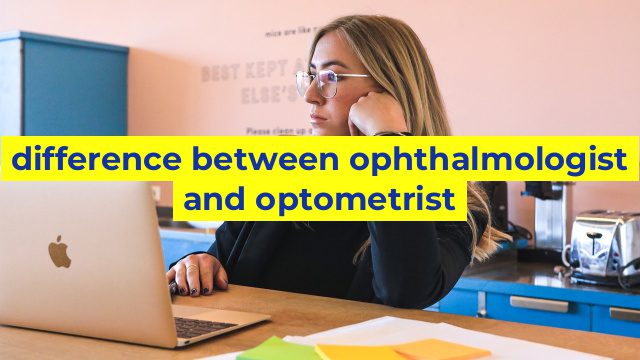Understanding the Difference between Ophthalmologist and Optometrist
When it comes to our eyes, most of us are concerned about their health, vision, and overall well-being. This is why it’s important to choose the right professional for your eye care needs. In the world of eye care, ophthalmologists and optometrists are two different professionals that you may encounter. Here, we’ll take a closer look at the difference between ophthalmologists and optometrists.
What is an Ophthalmologist?
An ophthalmologist is a medical doctor who specializes in the eyes and their related structures. They can diagnose and treat a variety of eye conditions, perform surgery, and prescribe medications or glasses. With additional training, some ophthalmologists may also specialize in certain areas, such as glaucoma, cataracts, or pediatric ophthalmology. Ophthalmologists can perform complex surgeries, such as those for retinal detachment or corneal transplants, typically in a hospital or surgical center.
What is an Optometrist?
An optometrist is a healthcare professional who specializes in vision care. They can perform eye exams, prescribe glasses or contact lenses, and diagnose and treat certain eye conditions. Unlike ophthalmologists, optometrists do not perform surgery or treat more serious eye conditions. Instead, they focus on routine vision care, such as prescribing glasses or contacts and monitoring the overall health of your eyes.
Which One Should You Choose?
Choosing between an ophthalmologist and an optometrist largely depends on your individual needs. If you’re experiencing symptoms of a serious eye condition, such as sudden vision loss, pain or discomfort in the eye, or the appearance of floaters, you should schedule an appointment with an ophthalmologist. They can diagnose and treat more serious conditions and perform necessary surgeries.
On the other hand, if you’re simply due for a routine eye exam, need a prescription for glasses or contacts, or want to monitor the health of your eyes over time, an optometrist may be the right choice for you. They can perform comprehensive eye exams and provide guidance for maintaining healthy eyes.
In conclusion, understanding the difference between ophthalmologists and optometrists can help you make the best decision for your eye care needs. Whether you’re experiencing symptoms of an eye condition or simply need a routine exam, it’s important to choose a qualified and experienced professional for your eye care.
Table difference between ophthalmologist and optometrist
| Ophthalmologist | Optometrist | |
|---|---|---|
| Education | Medical degree (MD or DO) | Doctor of Optometry (OD) |
| Specialization | Specialization in eye diseases; can perform surgery | Specializes in vision care and correction; cannot perform surgery |
| Prescriptions | Can prescribe medication and perform surgeries | Can prescribe corrective lenses and medications for certain eye conditions |
| Training | Trained to treat medical and surgical conditions | Trained to perform eye exams, prescribe correctional lenses, and diagnose certain eye diseases |
| Scope of practice | Can diagnose and manage all eye diseases and conditions | Can diagnose and manage many eye diseases and conditions, but may refer patients to ophthalmologists for surgery |


